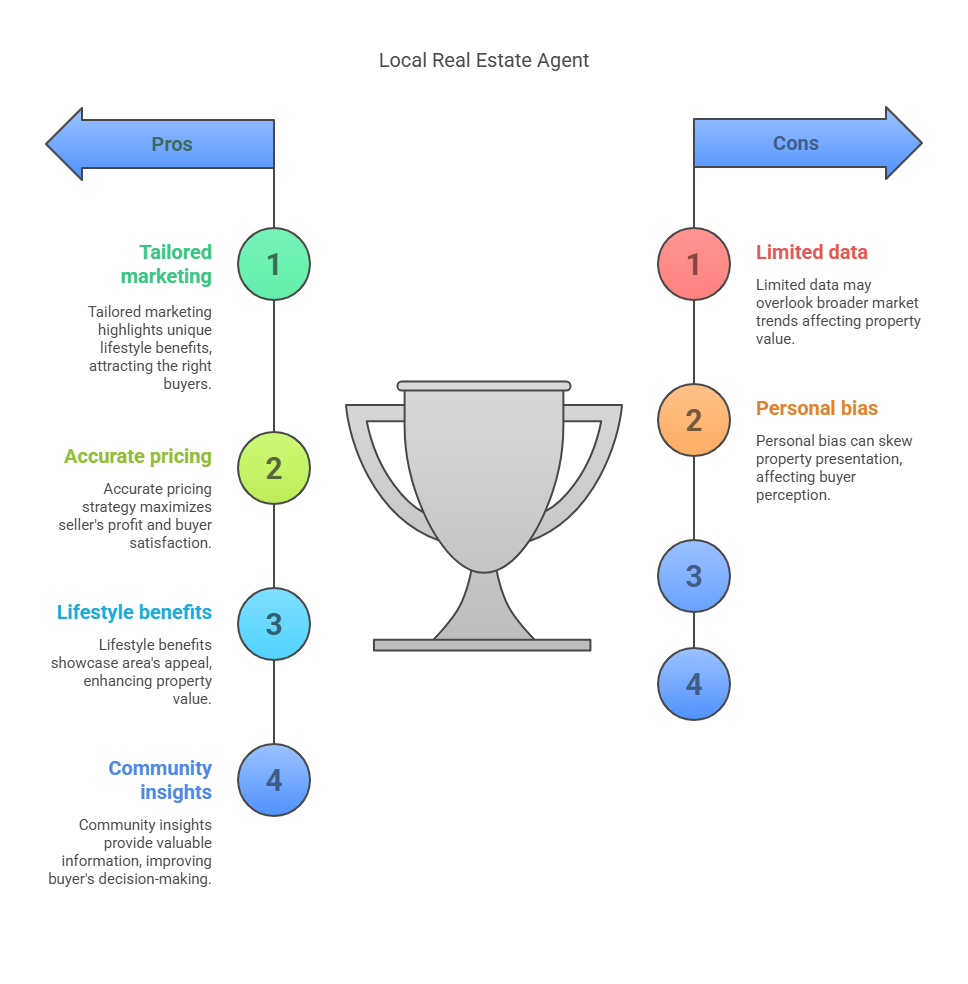The Human Touch: Why a Local Real Estate Agent Beats Algorithms Every Time
.jpg)
In a world where property listings are just a click away and automated valuation models spit out prices in seconds, it might seem like real estate is becoming a game of algorithms. But if you’ve ever sold or bought a home, you’ll know there’s far more to the process than square footage and postcode data. When the stakes are high — and they usually are in property — the human touch still matters. And that’s where a skilled local real estate agent proves invaluable.
While technology has undoubtedly changed the landscape, it hasn’t replaced the need for experience, instinct, and emotional intelligence. A local real estate agent offers insights, advice, and service that algorithms simply can’t match. Here's why.
Real Estate Is Emotional — and Humans Understand Emotion
Buying or selling a home is more than a transaction. For most people, it’s tied up in years of memories, future dreams, or financial stress. Algorithms can calculate, but they can’t empathise. They can’t pick up on the hesitation in a buyer’s voice or the excitement in their tone during an inspection. They can’t adjust their pitch or approach based on the seller’s circumstances or a buyer’s body language.
A local real estate agent has the emotional intelligence to guide clients through every step of the process. They know when to push for a higher offer and when to advise acceptance. They understand the importance of timing, communication, and reassurance — none of which you’ll find in a spreadsheet or AI model.
Local Knowledge Trumps Data Sets
You can’t programme the soul of a neighbourhood into an algorithm. Yes, digital tools can show recent sales, school rankings, and demographic shifts. But a local real estate agent lives and breathes the area. They know which streets are noisy at 3pm, which parks are family favourites, and which cafes draw a weekend crowd.

That local knowledge doesn’t just help buyers — it’s a key advantage for sellers too. It informs pricing strategy, helps tailor marketing to the right audience, and ensures every listing highlights the most compelling lifestyle benefits. A local expert knows what makes your area special and how to position your home in the best possible light.
Algorithms Are Reactive. Agents Are Proactive.
Most online tools analyse past data to estimate current value. But real estate isn’t static — it’s a moving market. A local real estate agent understands current buyer sentiment, recent auction results, and what’s happening right now in your neighbourhood. They can spot a trend before the data reflects it and act accordingly.
Let’s say a new café has opened and suddenly the street around it has become more desirable. Or a council has announced a rezoning that will drive future demand. These things take time to show up in automated valuations, but a local agent is already adjusting their advice and strategies based on firsthand knowledge.

Communication Matters — and So Does Trust
No algorithm can replace the trust built through a face-to-face conversation. Sellers want someone they can ask questions, vent frustrations, and seek reassurance from. Buyers often need guidance on how the offer process works, what to include in their conditions, or how to negotiate repairs after an inspection. A local real estate agent builds rapport and trust through communication — clear, responsive, and tailored to each client.
Good agents also communicate regularly, giving you honest feedback from open homes, buyer insights, and updates on how your campaign is tracking. An algorithm won’t call you back after a disappointing inspection or show up early to fluff pillows and turn on lights.
Tailored Service vs. One-Size-Fits-All
Algorithms treat all properties like data points. A three-bedroom home is just a three-bedroom home — regardless of whether it’s freshly renovated, north-facing, or has a lush garden oasis out the back.
A real estate agent knows how to highlight those unique features that can make or break a sale. More importantly, they know how to tailor their pitch depending on who walks through the door. A young couple might want to hear about proximity to transport and nightlife, while a growing family might want reassurance about schools and safety.
That ability to adapt — to read the room and connect with each buyer — is something algorithms just can’t do.
Stronger Negotiation Outcomes
Negotiation is an art, and algorithms don’t negotiate. They don’t read the market temperature, assess a buyer’s urgency, or strategically time a counter-offer. A skilled local real estate agent does all of this and more.
They can create competitive tension by managing multiple offers, follow up with interested buyers without seeming desperate, and guide sellers through complex decisions. They’re also trained to handle objections, navigate difficult conversations, and close deals that otherwise might fall through. This level of negotiation skill can add thousands to your sale price — far more than any AI-generated estimate can predict.
Community Ties and Off-Market Opportunities
A local agent is often deeply embedded in the community. They have relationships with tradespeople, stylists, photographers, buyers’ agents, and other locals. That network means quicker fixes, better presentation, and in some cases, early access to buyers who are ready to move.
They also know about off-market opportunities — people looking to buy or sell quietly. These deals often never make it to the public listing sites but result in successful sales at fair prices thanks to trusted local connections.

The Bigger Picture
At the end of the day, real estate is about people. Algorithms can enhance the process, but they should never replace the human element. The best outcomes happen when data is used to support — not substitute — the insights and instincts of a professional.
A local real estate agent combines the latest tools with on-the-ground experience. They blend strategy with empathy. They deliver a service that is both informed and personal, driven by results but rooted in relationships.
So, when it’s time to sell your biggest asset, ask yourself: do you want an algorithm guessing your home’s value, or a trusted local expert who understands what it’s really worth?
Final Thoughts
A knowledgeable local real estate agent brings not just knowledge of the market, but a genuine understanding of what makes your home — and your neighbourhood — worth every penny. And that’s something no algorithm can ever match.







.jpg)

